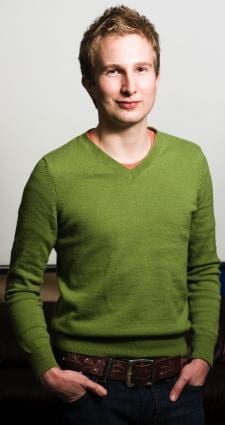His name is Mark Lucas, and he comes to the Capital from the AIDS Committee of London (Ontario) where he was an HIV prevention educator, focussed on doing outreach to the larger community of men who have sex with men in the London area.
At ACO, his title is Gay Men’s Health and Wellness Coordinator — a position formerly held by Adam Graham before his move to Vancouver this summer. Lucas does inter-organizational work, including helping out with the Gay Men’s Wellness Initiative, and he’s the one behind this year’s Snowblower.
Snowblower, which will be running for the third time in Feb 2009, is a refreshing approach to gay men’s wellness. It certainly acknowledges the concrete need for circulating varied health information in the gay men’s community in Ottawa — such as workshops that outline the benefits of massage, local gay men’s sporting leagues to take part in and HIV prevention and management strategies. But underneath it all, the idea of the event is building community.
Sounds like a nice idea, right? But the motivation goes deeper than that — it’s because we tend to make healthier choices for ourselves when we feel embraced by a larger community. Bringing gay men together for discussions about their health is one way to create that feeling, while providing space to share essential information and inform each other’s individual choices.
“You have to provide a spectrum of ways for men to choose their own path to health and well-being,” says Lucas. “Whether that be harm reduction techniques in terms of sexual health or quitting smoking in a gradual way that will suit the lifestyle of the individual. The preaching of black-and-white doesn’t happen at Snowblower — it’s a lot more about men having options.”
This event dovetails nicely with Lucas’ approach to HIV prevention work, which centres around creating a more holistic vision of health via our connections to each other.
“We’re looking at the holistic needs of men who have sex with men — focussing not just on harm reduction as it relates to HIV transmission, but also looking at how men can improve their ability to negotiate safe sex, their mental health and physical health, their needs with respect to spirituality, re-establishing [ties] with family or finding new ways to network socially and create the supports they need. There’s a much larger focus that we have now in HIV work. The job I do now addresses these needs a lot more broadly.”
Given this holistic view of health needs and preventative programming, I wonder aloud about what Lucas thinks we need to do to make the most impact in HIV prevention work for gay men in Canada. His answer is surprising.
“We need to re-evaluate where [we are] in terms of eradicating homophobia in Canadian society. The effects of homophobia on all different aspects of gay men’s health are quite profound,” says Lucas. “When people lose their social or familial supports, there seems to be a trend toward less negotiating of safe sex, higher levels of depression and less contact with health service providers.”
But, knowing that there are myriad ways to tackle the problem of homophobia, where should we go from here?
“Starting education young in terms of tolerance,” says Lucas. “There’s an amazing documentary from 1993 called It’s Elementary, about teaching elementary-age school children tolerance toward the gay, lesbian, bisexual and trans community. Simply tolerance — it’s not sexual health information that the kids are being given. There’s a sequel to that, just released this year, which shows the long-lasting, positive effects of teaching young kids what being gay is and why being gay is okay. Follow-up interviews with the kids in the second documentary show the impact it made [on the kids] to have teachers put themselves professionally at-risk to teach these really important principles of tolerance. They’re now able to do the same thing as adults 15 years later — to say that being gay is as viable an identity as any other.”
And when it comes to the sexual education that kids will receive a little further down the line? Lucas expresses concern about the potential for heightened HIV transmission due to the current direction the federal government is taking when it comes to legislating teen sexuality in Canada.
“I think that, by raising the age of consent, we’ve criminalized a sector of the population that is highly at risk,” says Lucas. “We’re seeing more and more infections amongst young adults between the ages of 15 and 24, and I don’t understand how schools will teach safer sex education when kids aren’t supposed to be having sex. It’s going to have a profoundly harmful effect on sex education.”
With so much change needed on these issues and an obvious fire in his belly, it would seem that the nation’s capital is the right place for Lucas. After all, the federal government is a stone’s throw from his office and throngs of NGOs and activists stand at the ready for the next fight.
“Ottawa has proportionally higher rates of infection amongst gay men, so we certainly need to take a long, hard look at how our resources are being spent in this community and how we can change the institutions to better serve the many marginalized populations in a large, multi-cultural city like Ottawa.”

 Why you can trust Xtra
Why you can trust Xtra


